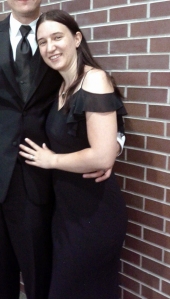Kara and Jim are good friends of mine whom I’ve mentioned here before. I convinced Jim to try going paleo around June of this year after I loaned him Gary Taubes’ Why We Get Fat (basically a toned-down and more-accessible version of his now-classic Good Calories Bad Calories). As of this writing he has lost 20 pounds and pretty much cured the frequent headaches he apparently has had since childhood. He and I now spend a lot of time exchanging recipes for offal meats and going on outdoor play adventures.
Kara (his wife), however, has not gone explicitly paleo. Despite this, she too has had some significant successes and improvements. I think her story is even more interesting and has a lot to teach those of us who are already neck-deep in paleo rhetoric. With her permission, I am sharing it with you here.
 Kara and Jim immigrated to California last fall. Before this, they lived in Michigan where their lives followed a pattern that is probably pretty emblematic of Conventional Wisdom. They knew that fresh vegetables and protein were good for you but often couldn’t afford them in higher quantities. They did a lot of shopping at Trader Joes, but leaned heavily on pre-made and partially-made meals, especially during the colder months of the year when fresh food was even more expensive. Most of their exercise was limited to the exercise that naturally occurs as you live your life, such as walking places, but unfortunately the suburbs where they lived were so spread out that walking was often out of the question. Outdoor activities were limited to the better months of the year, but even during those brief windows Kara eschewed things like hiking because she thought it was tiring and boring.
Kara and Jim immigrated to California last fall. Before this, they lived in Michigan where their lives followed a pattern that is probably pretty emblematic of Conventional Wisdom. They knew that fresh vegetables and protein were good for you but often couldn’t afford them in higher quantities. They did a lot of shopping at Trader Joes, but leaned heavily on pre-made and partially-made meals, especially during the colder months of the year when fresh food was even more expensive. Most of their exercise was limited to the exercise that naturally occurs as you live your life, such as walking places, but unfortunately the suburbs where they lived were so spread out that walking was often out of the question. Outdoor activities were limited to the better months of the year, but even during those brief windows Kara eschewed things like hiking because she thought it was tiring and boring.
Then they moved to California. Almost immediately, the foundation of their lives changed in big ways. For starters, out here we are blessed to have fresh produce at decent prices throughout the year. They soon started shopping at their local Mexican market for produce and complemented it with fresh meats as well. They still were eating grains and some processed foods, but by increasing the amount of fresh, quality, home-cooked foods in their diet, Kara lost about 10 pounds.
I’m going to say that again. By simply increasing the amount of fresh foods in their diet, they started to get healthier.
Over time, other things improved as well. Kara was biking to work almost every day and they both got out into the city to walk around more than they had in their past life in the suburbs. Soon my boyfriend, Chris, and I, started taking them out camping and they discovered that hiking for the sake of hiking could be fun in and of itself.
When Jim went paleo, things changed for them again. He is the primary cook in the house, so he simply stopped cooking grain-based foods and other processed foods. Kara didn’t take much notice of this at first. She let Jim eat what he wanted and still ate sandwiches and other standard food when she was on her own out of the house.
Many paleo-people might scoff at that, claiming that any amount of wheat or sugared coffee in her diet would ruin any advancement toward health. The idea behind such popular programs as the Whole 30 and the 21 Day Sugar Detox is that you need to be 100% committed to the plan and they either imply or explicitly say that if you slip up, the program is ruined and you need to start over. Now, I have no problem with this approach in theory, since these programs are for limited, pre-defined periods of time and are supposed to be more like short-term cleanses. They can also get you more in touch with your own body’s needs. I myself did a sugar detox and discovered that I’m a lot more sensitive to fresh dairy than I originally realized and have now all-but dropped it from my regular diet. But this approach is also dangerously close to the approach of many “mainstream” diets and weightloss programs that goad you into sticking with the plan through fear and shame. The diet is put on such a pedestal that oftentimes when people “fall off the wagon” they go into a shame spiral that leads them to abandoning the whole thing.
The point I am making here is that most people can still have significant health gains while still allowing themselves some “wiggle room.” This is, of course, the idea behind Mark Sisson’s 80/20 principal, which says that, in the long run, you’re going to get the most significant jump in results after putting in just 80% of the effort. Perhaps more importantly, allowing yourself an error-bar of 20% allows you to more-easily forgive yourself your occasional cravings and slip-ups. Self-forgiveness has been clinically shown to improve outcomes in situations such as substance recovery and even basic learning scenarios. Perhaps equally as important—if not causally-linked—self-forgiveness can help reduce stress, and reducing stress is an important marker for overall health. Thus, in summary, strict adherence to a diet might be good for short periods, but for most people, diets are going to be more sustainable if you allow for more flexibility.
 So what happened with Kara? Well, even though she was letting herself have occasional sandwiches and pastries when she was out of the house, after a few months of eating Jim’s home cooking (and mine, actually, lol) her weight plummeted. Over the last few months she has lost almost 15 pounds. This both pleases and frustrates her to no end, since some of the clothes she bought at the beginning of the summer are now swimming on her. She is showing some excellent muscle tone without significantly increasing her exercise, and her skin has improved markedly as well.
So what happened with Kara? Well, even though she was letting herself have occasional sandwiches and pastries when she was out of the house, after a few months of eating Jim’s home cooking (and mine, actually, lol) her weight plummeted. Over the last few months she has lost almost 15 pounds. This both pleases and frustrates her to no end, since some of the clothes she bought at the beginning of the summer are now swimming on her. She is showing some excellent muscle tone without significantly increasing her exercise, and her skin has improved markedly as well.
Even more interestingly, her body has started to speak up on its own behalf. As Jim went paleo and she had more conversations with him and me about it, she conceded that sugar wasn’t great for her health no matter what and reducedd—and eventually completely stopped—putting sugar in her coffee. Last week she was making cookies for a care package to send to a friend of hers and of course sampled a couple. After eating them, though, her mouth felt, quote, “weird and gross,” and the next day she had bloating and stomach pains. She knew immediately that she was reacting to the sudden dose of gluten and sugar after being tapered off of it for so long. Rather than complain and try to fight back, though, she has willingly embraced her fate and is now looking up low-sweetener and gluten-free baking recipes instead. (Which, of course, Jim and I have no problem with. Although she bemoans the fact that after years of experimenting she had only just mastered wheat-flour based tart crusts and now has to start over.)
So the next time you find yourself beating yourself up because you ate, like, five too many dates, or are agonizing over which additive-containing brand of coconut milk is the lesser of two evils, remember that you are already way ahead of the curve and—all else being equal*—it’s better to focus on the larger issues.
(*I do concede that some people are struggling with more subtle food sensitivities and hormonal issues that might take a finer level of control, but I do believe that such cases are the exception rather than the rule.)

You cropped out my face!